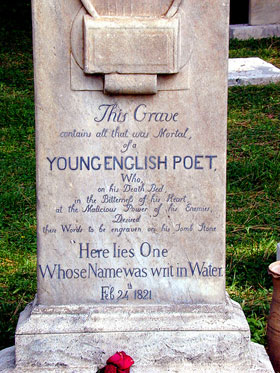A Poet's Reputation
Keats published one of his first major poetic works, Endymion, in 1818. The poem received a brutal reception from the critics whose responses you can read below, alongside a more favourable review from one of Keats' friends. Keats was badly affected by negative reviews and felt little hope of a poetic legacy after his death, evidenced in the text he composed for his own headstone. In 1834, thirteen years after Keats' death his publisher remarked 'The world cares nothing for him.' (See Andrew Motion's 1997 biography, listed in Further Reading).
Keats' early death – he died of consumption in 1821, at the age of 25 – affected certain contemporaries' responses to him, and continues to colour interpretations of him today. At the time, it was rather cruelly suggested that his death was caused by a particularly scathing review, a view reinforced by Keats' infamous contemporary Lord Byron. And yet today, John Keats is one of England's most famous poets.
TASK
Explore the materials on this site, including the documents on this page, and consider different opinions on Keats to answer the following questions:
